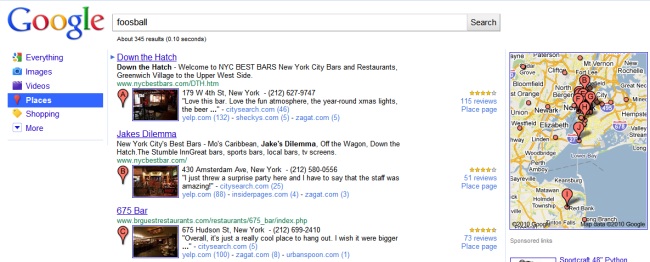
Today, Google launched Place Search, a section of its search engine intended to help users find out more about locations. The web service is a compliment to Google’s Android app called “Places,” which uses GPS and Google Maps to help smartphone users find local restaurants, businesses, bars, attractions, hotels, ATMs, Gas Stations, and whatever else they happen to search for in the app. Google added Places to Android devices as part of its Android 2.2 Froyo OS update a couple months back.
The web version of Places is not revolutionary. It works a lot like Google Maps with added context. A search for Best Buy will bring up the company’s website, nearby stores, user reviews of those stores, and a handy map on the right side of the screen. While mostly a tweak of existing search services, Place Search does a good job of focusing on local, location-based results. Place results should intelligently appear in regular Google searches as well if the company thinks you’re searching for a nearby location.
“We’ve made results like this possible by developing technology to better understand places,” said Jackie Bavaro, product manager, in a blog post. “With Place Search, we’re dynamically connecting hundreds of millions of websites with more than 50 million real-world locations. We automatically identify when sites are talking about physical places and cluster links even when they don’t provide addresses and use different names (“stubb’s bbq” is the same as “stubbs bar-b-que”).”
The service will be available in 40 languages in the next few days. Hopefully Google will not get in trouble for this new feature, as has been the trend lately.
Editors' Recommendations
- Google is launching a powerful new AI app for your Android phone
- Your next Samsung phone might ditch Google Search for Bing
- Google launches Switch to Android app to chirping crickets
- Google Maps is adding new shopping tools for the holiday season
- The Pixel Fold’s no-show is a massive missed opportunity for Google